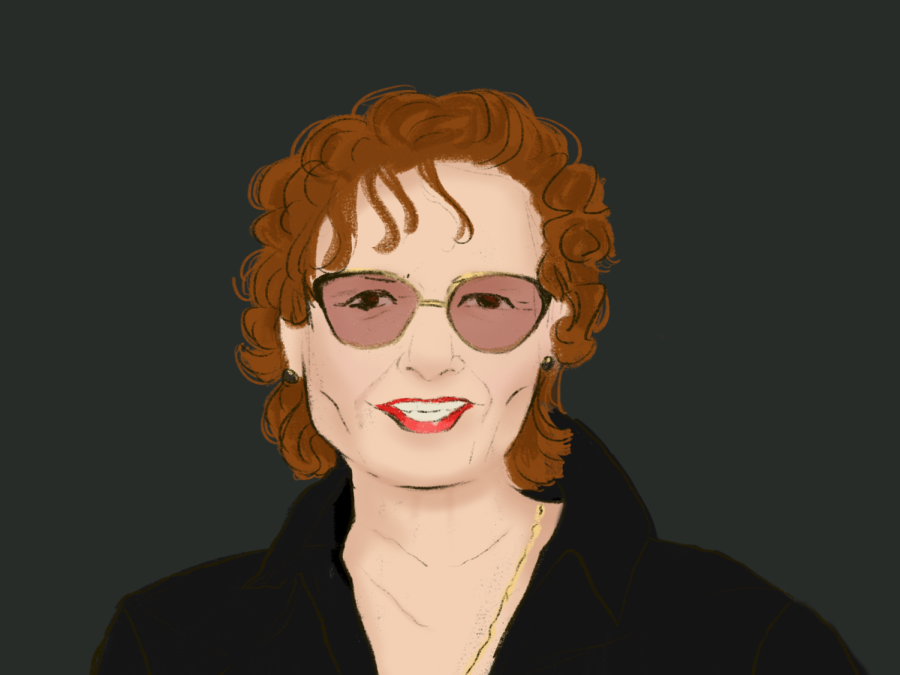How Vivien Goldman became NYU’s Punk Professor
What do Bob Marley and the Slits have in common? NYU professor Vivien Goldman, for one.
Vivien Goldman is a British journalist and post-punk musician. Goldman teaches at Tisch as an adjunct professor. (Illustration by Susan Behrends Valenzuela)
September 6, 2022
Vivien Goldman, an adjunct reggae and punk professor at the Tisch School of the Arts, grew up surrounded by music in her London home, where she lived with her Jewish parents who had fled Nazi Germany. Her father was a musician who escaped with his violin in tow.
In the past five decades of her career, Goldman has pursued the musical skills of her family: writing as an esteemed music journalist, DJing French pirate radio, working as Bob Marley’s first U.K. publicist, and even stealing Public Image Ltd’s studio time to record her debut single. She even formerly wrote a blog called Ask the Punk Professor.
While Goldman grew up at the forefront of ’70s London punk as it veered towards reggae and beyond, her original intention had not been to pursue music. She was originally interested in film and thought she would become a scriptwriter.
After graduating from the University of Warwick, Goldman was discovered by an English music magazine, named Cassettes and Cartridges, that she was given on the train. This magazine, which included coverage on punk and reggae, was the beginning of her career in music journalism. Due to the amount of work at the up-and-coming magazine, she ended up writing, despite being hired as an editor secretary.
“Although [music journalism] was a field where you’d never get rich, you got free records and junkets to exotic places,” Goldman said.
She went on to work in marketing for artists at TransAtlantic Records after her stint at Cassettes and Cartridges before taking a publicity job at Island Records. Although she worked at Island Records for less than a year, within that time, she became Bob Marley’s first U.K. publicist. While some could see punk and reggae as an unlikely combination, Goldman never did.
“There’s a connection, a whole genre, a whole movement between punk and reggae that a lot of Americans aren’t aware of called ‘Rock Against Racism’,” Goldman said.
Emerging in 1976, Rock Against Racism was a political and cultural movement that began in response to racist attacks in the United Kingdom. The movement brought attention to injustice within the country, and decreased support for the far-right National Front political party at the ballot box.
“In England, the Black community was growing up in a hostile environment with laws designed to target them, things that will not be unfamiliar to residents of America today,” Goldman said. “There was an ad hoc union between Punks and Rastas because Rasta became a rebel flag to unite that generation of Black British citizens. It was the first time Black and white bands were sharing a platform — it encouraged these political movements.”
Goldman left Island Records in the mid-70s, to write and edit for Sounds, a weekly rock newspaper in London known for covering punk and heavy metal music. She found music journalism to be exceedingly male-dominated, with the exception of punk.
“Punk was rather like a bright comet.” Goldman said. “It was a spirit which never died despite all attempts at commodification. It was a particularly liberating force for women, and it continues to be so, as seen in my book ‘Revenge of the She-Punks.’”
As a retrospective of women in punk, the book was written to “respond to a need and try to fill a void, try and plug a gap in our knowledge and establish the legacy of women’s artistry unleashed and enabled by punk,” according to Goldman.
“Revenge of the She-Punks” addresses many challenges that female musicians and artists continue to face, such as underrepresentation and a lower salary in comparison to men. Combining her knowledge of music and journalism, Goldman exemplifies how punk is adapted into specific sonic and cultural agendas.
“I worked at Sounds for a few years and steered [the magazine] towards a more punk and reggae direction, and then I went freelance,” Goldman said. “All of the music magazines and record companies were much wilder in that time. There was much more free wheeling. Now, everything is corporatized and multinational. People back then used to express their passions a lot, especially in the music papers. It’s not like now, where it’s very professional.”
Goldman was never trained officially for television or journalism, but instead jumped straight into the field, providing an authentic and straightforward point of view in her work.
In the late ’70s, Goldman started making her own punk and reggae influenced music, such as “Launderette,” which was co-produced with Public Image Ltd’s John “Rotten” Lydon and Keith Levene. Mixing jazz, noise and riddims, Goldman collaborated with experimental artists, such as Steve Beresford and The Flying Lizards.
“I had always done reggae backup singing for people like Ari Up From the Slits,” Goldman said. “My song ‘Her Story’ was sampled by The Roots, back in the day. Even when I was a journalist I was doing reggae backup singing.”
The only official job she has ever had was at Channel Four, where she produced music documentaries for the BBC, carrying out her dream of working in film. She traveled internationally to interview musicians who created punk, afro-beat, and reggae music.
“I made music videos, one of which is in the Museum of Moving Image,” Goldman said. “I had a company with a partner and we had a huge music TV series that was international, called Big World Cafe. Then I moved to America. Again, there were actually no female directors, really, just as there had hardly been any female music journalists.”
After moving to New York City in 1995, Goldman began teaching at NYU’s Clive Davis Institute of Recorded Music, where she has been consistently working ever since.
“It was a blessing to me by the great Jason King, the chair of the department at the Clive Davis Institute,” Goldman said. “He brought me into teaching and it’s been really wonderful for me, and I hope for the students as well.”
Goldman is teaching a David Bowie course at Clive Davis this semester. Throughout her eclectic career, she has remained open to opportunities.
“I was very molded by Bob Marley, ‘to try and put yourself to use,”’ Goldman said. “There were things that I wanted to accomplish, but my work wasn’t necessarily thought out like a career. I had been trying all my life to accomplish them, but maybe that’s what a career is if you’re not really a corporate person. This is the career of a freelancer who has to be quick on their feet and try to think fast in a changing environment”.
Contact Clara Scholl at [email protected]




























































































































































